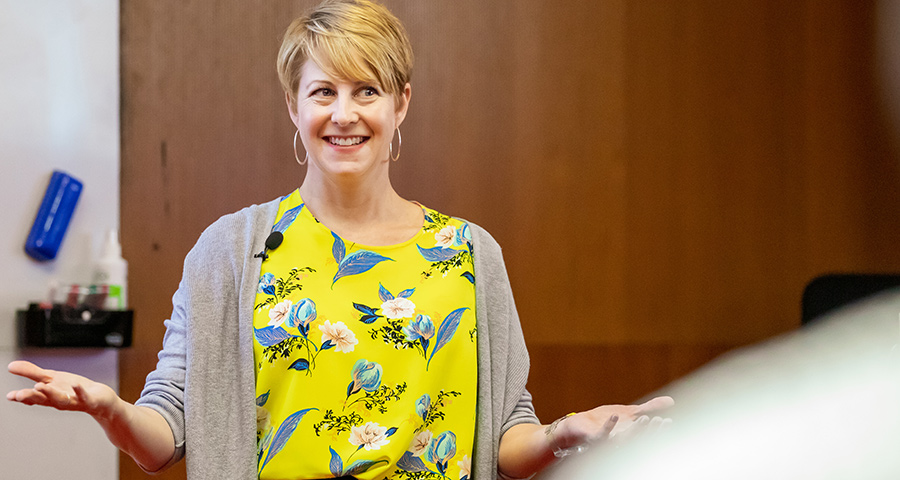
Molly Wright Steenson on AI: “Every time you talk about an algorithm, you’re also talking about a person”
Molly Wright Steenson visited CMU-Q to teach a micro course on artificial intelligence and society. Steenson shared with CMU-Q News why students should think about the broader ethical questions of AI.
Artificial intelligence seems to be a topic that’s on a lot of people’s minds.
This year I did a quick search on news mentions of AI and ethics, and it’s something like three times as many mentions this year as the year before. And I think that that might’ve started after the last US election with Cambridge Analytica and Facebook and questions of privacy. These questions are things that everyday people are encountering and we all have questions about their impact on our worlds. And so that’s why this is so timely.
What are some of the questions about AI that your students will explore?
A lot of times we use that term, ‘artificial intelligence,’ and we don’t even think about what it means. Every time you talk about an algorithm, somewhere in there you’re also talking about a person—maybe a person who loses a job as a result, or maybe the person who created the algorithm. We’re going to look at people and some of the fields that AI will touch.
So what does artificial intelligence mean?
Last night, one of the things we did in our first class was to talk about what is intelligence. The set of things that students came up with were really interesting. It could be control over one’s behavior or emotions. It could be the ability to act rationally. It could be the ability to learn. It could be cleverness or humor. I think some of the ideas of what people have about what AI is, or could be, reflect those ideas.
Your micro course is called AI and Society. How are you approaching these questions for students in Qatar?
It’s not just generic society, I would like for the micro course to be an opportunity for students to think about their worlds and the things that they experience personally here. I think it’s an opportunity to talk through these very big issues and sometimes very technical issues in a way that’s a lot closer to home for most people.
How did you become interested in AI?
My background is in the early worldwide web and user experience. Then I went to architecture school in order to figure out how those things combined with the universe in the built environment, which led me to study the history of artificial intelligence.
It seems like an unusual way into the field!
It is maybe a little bit strange on the outside, but if you think of it, you need to make design decisions and architectural decisions to know how AI fits into the world.
Can you explain what design has to do with AI?
It’s where the rubber meets the road. Any decision that’s made by an engineer or computer scientist or a statistician or a coder somewhere about an algorithm is going to meet you or me at some point, whether it’s an interface, an object, a product, or a governmental system. So that’s why I think talking about this from the sense of how something is designed is so important. It’s about how it fits into our world.
Will robots rule the world one day?
Alan Turing wrote about AI being like a blank pages of a notebook, kind of like a child’s mind that can learn and develop over time. So if a system can learn, it can grow and it can adapt. We’re at a point in time where we see narrow or weak AI, but still there’s a lot to learn and do in those areas. I don’t see robots taking over the world completely anytime soon, but I think it raises some really interesting questions.
Molly Steenson is the senior associate dean for research at Carnegie Mellon’s College of Fine Arts. She is also the K&L Gates Associate Professor of Ethics and Computational Technologies and an associate professor in the School of Design.
